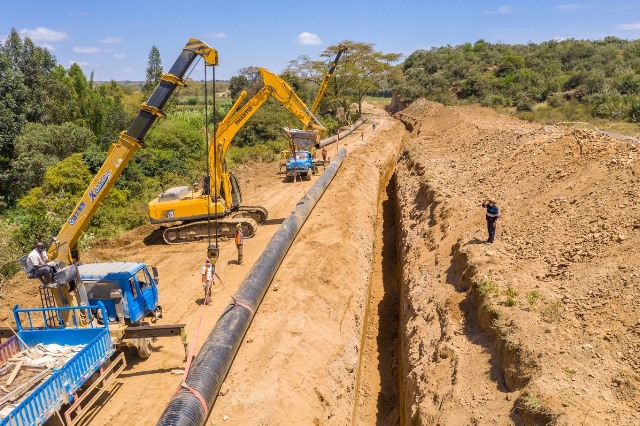Until mid 2020, Narok County had no sanitation system. The County had set aside a quarry near Narok town as a disposal area, but this was later shut down last year by the National Environment Management Authority (NEMA) after the quarry got full and was spilling into the adjacent Enkare Narok River.
With the use of Weholite technology the time to install the new sewerage network in Narok, will serve the fast-growing Narok County for the next 100+ years.
Weholite is a lightweight, engineered structured wall pipe made from high density polythene (HDPE) and is used extensively around the world in low pressure or gravity applications for drinking water storage, storm water, sewage and various other liquids.
Eng. Ranjit Singh Rupra of Mangat I.B. Patel (MIBP) Limited, Consulting Engineers says the cost of installing the sewage system in Narok has been cheaper and took a very short time as compared to if they would have used concrete pipes which is traditionally used.
“One of the advantages of using Weholite rather than concrete is the reduction in programme and cost due to the relative speed and ease of construction,” opines Ranjit.
It was Ranjit who recommended the use Weholite pipes for the Narok sewer system. Lightness, durability and ease of installation were the key factors behind his recommendation.
Ranjit adds: “Weholite offers distinct chemical and physical advantages over other more traditional materials. Superior hydraulics and abrasion resistance mean that it will not corrode or deteriorate over time, making it a long-lasting solution for projects in Kenya.”
“And it should last. Concrete has a shelf life of about 20-40 years, whereas Weholite should last for 125 years,” he says.
Daniel Mshana, the Technical Project Engineer at the Narok site said: “They (Weholite pipes) are far quicker and far easier to handle and install. You don’t have to use such large machines and therefore it is cost effective. With Weholite you save time and money putting them in the ground.
Megapipes Solutions Limited, which manufactures the HDPE pipes, had about five workers on site who weld the sections of pipe together. And the company had also trained local workers from Narok for pipe jointing and welding of Weholite pipes which will be useful knowledge for subsequent projects in Kenya.
The pipes are joined using continuous extrusion hot weld HDPE – a kind of giant glue gun that uses the same material the pipes are made of. Unlike concrete, which contains metal, polyethylene is not subject to corrosion. Weholite pipes use a patented structured wall process and with sizes up to 3.5m diameter is billed as the world’s largest plastic pipe according to Daniel Mshana.
Mshana says Weholite is an excellent choice because of its light weight. Installation is quick and reliable, with the pipes easily transported to the jobsite, even in poor ground conditions. Light pipe materials have a distinct advantage for foundation work, because Weholite does not apply as much load to its bedding as do heavier pipe materials.
Paul Njuguna Maina, the Assistant Resident Engineer – Narok Sewerage Project says Narok County should not only pride to be the first to use Weholite for its sewerage solution but will be an example for other Counties to follow.
“The cost and time spent on this stands out and other County Governments and even National Government should look into this solution as the future for sanitation, storm water and culverts for road construction,” says Maina.
Also read
Construction of dam at Julius Nyerere Hydropower Station begins
Lesotho Highlands Water Project construction picks momentum

